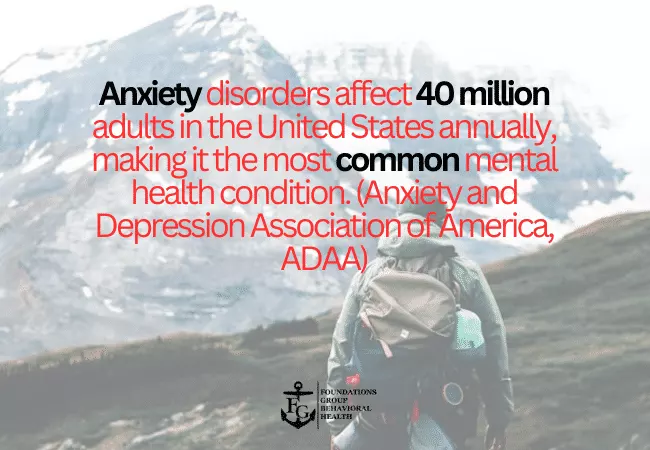Anxiety disorders affect over 40 million adults in the United States annually, yet many individuals experiencing anxiety don’t realize it. While some symptoms, such as excessive worry or panic attacks, are well-known, anxiety often manifests in subtle, hidden ways that are harder to identify. Recognizing these hidden signs is crucial for early intervention and effective treatment.
At Foundations Group Behavioral Health, we specialize in helping individuals understand and manage anxiety through evidence-based programs like our Anxiety Treatment Program, Psychiatric Day Treatment, Half Day Treatment Program, and Outpatient Mental Health Program. This guide explores the less obvious signs of anxiety, why they go unnoticed, and how comprehensive treatment can provide relief and long-term recovery.
What is Anxiety?
Anxiety is a natural response to stress or perceived threats, designed to protect us in dangerous situations. However, when anxiety becomes persistent, overwhelming, or disproportionate to the situation, it may indicate an anxiety disorder.
Types of Anxiety Disorders:
- Generalized Anxiety Disorder (GAD): Persistent and excessive worry about everyday matters.
- Panic Disorder: Recurrent, unexpected panic attacks characterized by intense fear and physical symptoms.
- Social Anxiety Disorder: Intense fear of social situations or being judged by others.
- Specific Phobias: Extreme fear of specific objects or situations, such as heights or flying.
- Obsessive-Compulsive Disorder (OCD): Unwanted, intrusive thoughts (obsessions) and repetitive behaviors (compulsions).
- Post-Traumatic Stress Disorder (PTSD): Anxiety triggered by traumatic events.
The Hidden Signs of Anxiety
While some symptoms of anxiety are overt, others can be subtle and easily mistaken for other issues or personality traits. These hidden signs often delay diagnosis and treatment, exacerbating the condition over time.
1. Physical Symptoms That Seem Unrelated
Anxiety frequently causes physical symptoms that individuals may attribute to medical conditions rather than mental health issues:
- Chronic headaches or migraines
- Muscle tension, jaw clenching, or teeth grinding (bruxism)
- Persistent fatigue despite adequate rest
- Digestive problems like nausea, bloating, or diarrhea (often called “nervous stomach”)
- Unexplained chest pain or rapid heartbeat
2. Difficulty Concentrating and Memory Problems
Anxiety often impairs cognitive functioning, leading to:
- Trouble focusing or following conversations
- Difficulty making decisions due to overthinking or self-doubt
- Forgetfulness or feeling mentally “foggy”
3. Irritability and Mood Swings
Individuals with anxiety may feel on edge, leading to:
- Irritability or anger over minor issues
- Rapid mood changes
- Emotional outbursts caused by accumulated stress
4. Avoidance Behaviors
Avoidance is a common coping mechanism for anxiety. Examples include:
- Skipping social events to avoid uncomfortable interactions
- Procrastinating on tasks that feel overwhelming
- Avoiding specific people, places, or situations that trigger anxiety
5. Sleep Disturbances
Anxiety can interfere with sleep in several ways:
- Trouble falling asleep due to racing thoughts
- Waking up frequently during the night
- Experiencing nightmares or feeling unrested even after sleep
6. Perfectionism and Overworking
For some, anxiety manifests as a drive for perfection or constant productivity. Signs include:
- Setting unrealistically high standards for oneself
- Excessively re-checking or revising work
- Feeling guilty when resting or relaxing
7. Overthinking and Rumination
Anxiety often traps individuals in cycles of overthinking:
- Replaying past mistakes or embarrassing moments
- Constantly worrying about future scenarios
- Focusing on “what if” situations
8. Excessive Need for Reassurance
Individuals with anxiety may frequently seek reassurance to calm their fears:
- Constantly asking others for validation or approval
- Double-checking instructions or decisions
- Seeking frequent updates on plans or situations
Why Do Hidden Signs of Anxiety Go Unnoticed?
Hidden signs of anxiety are often overlooked because they mimic other conditions or behaviors, such as physical illness, personality traits, or stress. Additionally, societal stigma around mental health may prevent individuals from acknowledging their symptoms or seeking help.
At Foundations Group Behavioral Health, we are trained to identify and address both overt and hidden signs of anxiety, offering personalized care tailored to each individual’s needs.
Common Misconceptions About Anxiety
Anxiety is one of the most common mental health conditions, yet it is often misunderstood. These misconceptions can prevent individuals from recognizing symptoms, seeking help, or understanding the impact of the condition. Let’s debunk some of the most prevalent myths about anxiety:
1. “Anxiety Is Just Overthinking.”
While overthinking is a symptom of anxiety, the condition involves much more than excessive worry. Anxiety affects the body, emotions, and behaviors, often causing physical symptoms like headaches, muscle tension, and digestive issues. It is a complex mental health condition that goes beyond simple thought patterns.
2. “Anxiety Only Means Panic Attacks.”
Many people associate anxiety solely with panic attacks, but anxiety disorders can manifest in numerous ways. For example, chronic worry, avoidance behavior, and perfectionism are less obvious yet common signs of anxiety. Not everyone with anxiety experiences panic attacks.
3. “Anxiety Is Just a Personality Trait.”
Some individuals dismiss anxiety as shyness, sensitivity, or a preference for being alone. While these traits might coexist with anxiety, they are not the same. Anxiety is a mental health condition that can significantly disrupt daily life if untreated.
4. “Everyone Feels This Way; It’s Normal.”
Stress and worry are natural responses to challenging situations, but anxiety disorders involve persistent and excessive fear that doesn’t go away once the stressor is resolved. When anxiety interferes with daily life, it goes beyond what’s considered “normal.”
5. “You Can Just Snap Out of It.”
Anxiety isn’t something individuals can control at will. It often requires professional treatment, such as therapy or medication, to manage symptoms effectively. Dismissing anxiety as something people can “get over” invalidates their experience.
How Hidden Anxiety Can Impact Daily Life
Hidden anxiety, with its subtle and often unrecognized symptoms, can quietly but significantly affect various aspects of an individual’s life. Unlike overt anxiety, which is easily identifiable through panic attacks or visible distress, hidden anxiety weaves itself into routines and relationships, often causing unseen harm.
1. Strained Relationships
Hidden anxiety can lead to communication issues and misunderstandings in personal and professional relationships. For instance:
- Avoidance of social events may be interpreted as disinterest.
- Irritability or mood swings caused by anxiety may create tension with loved ones.
- Excessive need for reassurance can strain relationships over time.
2. Reduced Work Performance
In the workplace, hidden anxiety can impair productivity and job satisfaction. Examples include:
- Difficulty focusing on tasks due to overthinking or mental fatigue.
- Avoiding responsibilities or procrastinating because of fear of failure.
- Overworking to meet unrealistic self-imposed standards, leading to burnout.
3. Negative Impact on Physical Health
Since anxiety often manifests through physical symptoms, hidden anxiety can lead to chronic health issues such as:
- Persistent headaches or migraines.
- Digestive problems caused by the “fight or flight” response.
- Insomnia and fatigue, which weaken the immune system.
4. Loss of Enjoyment in Life
Hidden anxiety robs individuals of the ability to enjoy the present moment. Overthinking past mistakes or worrying about future scenarios can overshadow experiences, leading to:
- A sense of detachment or lack of fulfillment.
- Difficulty engaging in hobbies or activities once enjoyed.
- Feelings of guilt or inadequacy for not “living up to expectations.”
5. Delayed Recognition and Treatment
The subtle nature of hidden anxiety often delays diagnosis and treatment. Without intervention, symptoms may worsen, potentially leading to more severe mental health conditions like depression or substance abuse.

Comprehensive Treatment Options at Foundations Group Behavioral Health
Effective treatment for anxiety begins with a thorough evaluation to identify all symptoms—both obvious and hidden. At our Behavioral Health Treatment Center in Massachusetts, we offer a range of programs to meet varying levels of need and help individuals regain control of their lives.
1. Anxiety Treatment Program
Our specialized Anxiety Treatment Program provides evidence-based therapies, such as:
- Cognitive Behavioral Therapy (CBT) to challenge negative thought patterns.
- Exposure Therapy to gradually reduce avoidance behaviors.
- Mindfulness-Based Techniques to manage stress and promote relaxation.
2. Psychiatric Day Treatment
This program offers intensive, structured therapy sessions during the day, allowing individuals to focus on recovery while maintaining some independence.
3. Half Day Treatment Program
A flexible option for individuals who need targeted treatment but also have work, school, or family responsibilities.
4. Outpatient Mental Health Program
Our outpatient program supports long-term recovery through regular therapy sessions that help individuals maintain progress and address emerging challenges.
5. Co-Occurring Disorder Treatment Program
For individuals with anxiety and co-occurring conditions, such as depression or substance use disorders, our integrated program provides comprehensive care for both issues.
Why Choose Foundations Group Behavioral Health?
At Foundations Group Behavioral Health, we offer a holistic approach to anxiety treatment that focuses on healing the whole person—mind, body, and spirit. Our team of compassionate professionals provides:
- Individualized Care: Tailored treatment plans based on each individual’s unique needs and goals.
- Evidence-Based Practices: Proven therapies to manage anxiety effectively.
- Supportive Environment: A safe and welcoming space where individuals feel understood and empowered.
Tips for Managing Anxiety in Daily Life
While professional treatment is essential, incorporating these strategies into your daily routine can help reduce anxiety:
- Practice Relaxation Techniques: Deep breathing, progressive muscle relaxation, or meditation can reduce physical tension and calm the mind.
- Stay Active: Regular physical activity releases endorphins, improving mood and reducing anxiety symptoms.
- Limit Caffeine and Alcohol: Both can exacerbate anxiety symptoms, such as restlessness and rapid heartbeat.
- Establish Healthy Routines: Regular sleep, meals, and exercise schedules create stability and reduce stress.
- Seek Social Support: Share your feelings with trusted friends or family, or join a support group.
When to Seek Professional Help
If anxiety—hidden or obvious—is interfering with your ability to function or enjoy life, it’s time to seek professional help. Early intervention can prevent symptoms from worsening and help you build the skills needed to manage anxiety effectively.
At Foundations Group Behavioral Health, we are here to guide you on your journey to recovery.
Take the First Step Today
Anxiety doesn’t have to control your life. By recognizing the hidden signs and seeking comprehensive treatment, you can regain control and thrive. Contact Foundations Group Behavioral Health today to learn more about our Anxiety Treatment Program, Psychiatric Day Treatment, and other services. Together, we’ll help you build a foundation for lasting mental well-being. Call us at 888.685.9730 to start your journey to a mindful future.
FAQ on Hidden Signs of Anxiety
What are the hidden signs of anxiety?
Hidden signs of anxiety include physical symptoms like headaches or digestive issues, difficulty concentrating, irritability, procrastination, perfectionism, and sleep disturbances.
Why do hidden anxiety symptoms go unnoticed?
Hidden anxiety symptoms are often mistaken for stress, personality traits, or physical health issues. Many individuals also minimize their symptoms or are unaware they may indicate anxiety.
How does hidden anxiety affect daily life?
Hidden anxiety can strain relationships, reduce productivity at work, impact physical health, and diminish enjoyment in life. It can also delay diagnosis and treatment.
What is the best way to address hidden anxiety?
The best approach is to seek professional help, such as an evaluation by a mental health expert. Programs like the Anxiety Treatment Program at Foundations Group Behavioral Health provide personalized care to manage symptoms.
What treatment options are available for hidden anxiety?
Effective treatments include therapy (e.g., Cognitive Behavioral Therapy), mindfulness techniques, medication management, and structured programs like Psychiatric Day Treatment, Half Day Treatment, or Outpatient Mental Health Programs.








